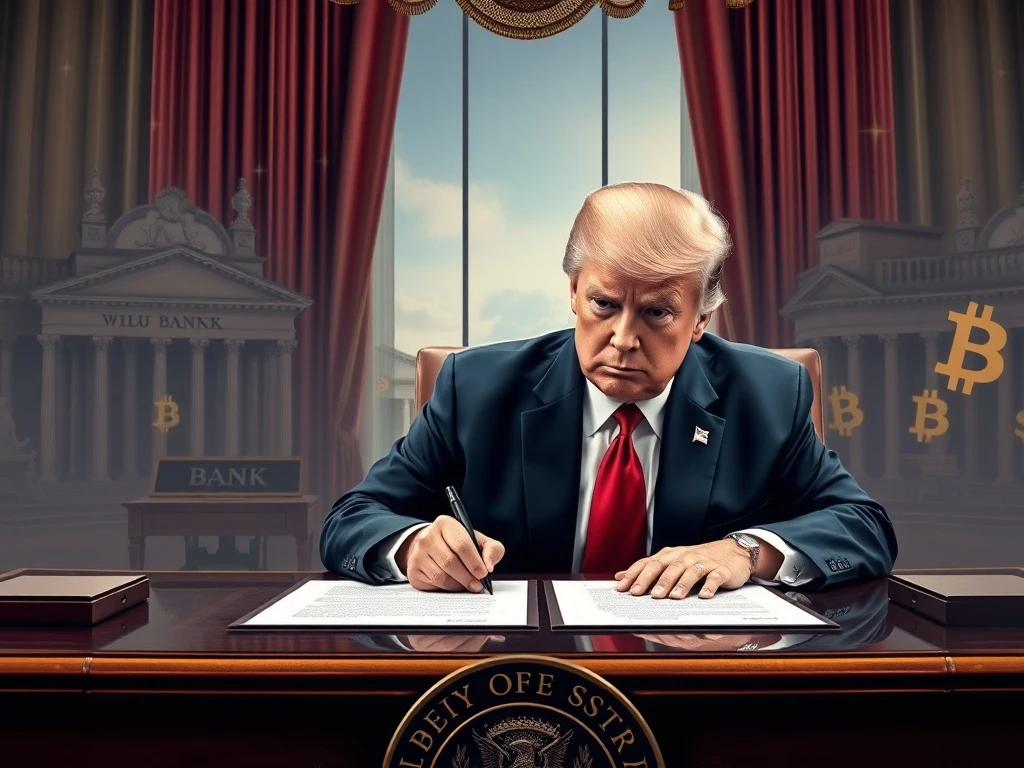Trump Unleashes Historic Executive Order Against Debanking Financial Institutions

The cryptocurrency world is buzzing with a significant development. Former US President Donald Trump is set to sign an executive order on Thursday. This order directly addresses “debanking,” a practice that has deeply concerned many in the digital asset space. This move could reshape how crypto companies interact with traditional finance, potentially opening new avenues for growth and stability. Many industry participants view this as a pivotal moment.
Trump’s Bold Move: Tackling Debanking Financial Institutions
US President Donald Trump is taking decisive action. He plans to instruct federal bank regulators to identify and penalize financial institutions involved in “debanking.” This practice involves denying banking services to businesses based on ideological reasons. Bloomberg reported this development on Thursday, citing a senior White House official. The executive order will require regulators to review complaint data. Furthermore, financial institutions under the Small Business Administration’s purview must strive to reinstate clients unlawfully denied services. This policy aims to foster a fairer financial landscape for all businesses.
For years, “debanking” has been a significant concern among various political groups. Gun manufacturers and fossil fuel companies, for instance, often reported being denied banking services. This denial stemmed from perceived ideological differences. Crypto companies also frequently faced similar challenges. During the administration of former President Joe Biden, allegations surfaced regarding “Operation ChokePoint 2.0.” Many believed this initiative aimed to push crypto businesses offshore, particularly during the 2022 bear market. Despite the change in presidential administration, these debanking allegations have persisted. Trump’s new executive order directly confronts these ongoing issues, signaling a clear shift in policy direction.
Understanding the Executive Order: Implications for Crypto Companies
The impending executive order holds significant implications, especially for the digital asset sector. According to Bloomberg, the order will direct regulators to remove the “reputational risk” category from guidance and training materials. Critics widely argue that this specific category was unfairly used to target and exclude crypto companies from essential banking services. Its elimination could provide a clearer path for digital asset firms seeking traditional financial relationships. This change reflects a more inclusive approach to the financial industry. Consequently, it may reduce the arbitrary denial of services based on subjective risk assessments.
The impact of this policy shift could be substantial. Historically, crypto businesses struggled to secure basic banking access. This made operations challenging and often forced them into less regulated environments. The removal of “reputational risk” as a basis for denial creates a more level playing field. It signals a governmental intent to integrate, rather than isolate, the burgeoning crypto economy. Therefore, this executive order could pave the way for greater mainstream adoption and legitimacy for digital assets within the US financial system. It represents a significant policy reversal for the industry.
Battling for Banking Licenses: A New Frontier
While the Trump administration moves to curb debanking, a parallel struggle is unfolding. A powerful coalition of bank associations actively seeks to block various crypto firms from obtaining banking licenses. These groups include the American Banking Association, Consumer Bankers Association, National Bankers Association, America’s Credit Unions, and Independent Community Bankers of America. On July 17, they sent a letter to the Office of the Comptroller of the Currency (OCC). This letter specifically aimed to prevent four digital asset providers, including Ripple and Fidelity, from securing their banking permits.
The associations raise several critical points in their letter. They argue that:
- “There are significant policy and legal questions” regarding whether the applicants’ proposed business plans involve “fiduciary activities performed by national trust banks.”
- The “public portions of the Applications do not allow for meaningful public scrutiny.”
This resistance highlights the ongoing tension between traditional finance and the innovative crypto sector. The image below shows a portion of their communication:

Several prominent crypto companies have recently applied for these licenses. Ripple, the creator of XRP (XRP), submitted its application on July 2. Just days before, Circle, the firm behind stablecoin USDC (USDC), filed to establish a national trust bank. This bank would manage its stablecoin reserves. These applications underscore the increasing convergence between traditional financial institutions and native crypto firms. This convergence intensifies competition across the financial services industry. Stablecoin companies, in particular, introduce new payment forms. These may potentially clash with the existing infrastructure provided by traditional banks and credit card companies. In a related development, the GENIUS Act, a US bill designed to regulate stablecoins and their issuers, was signed into law on July 18. This legislative action further solidifies the growing regulatory framework around digital assets.
Industry Reactions and Future Outlook for Crypto
The impending executive order from the Trump administration represents a significant policy shift. It directly addresses long-standing grievances from the crypto community regarding “debanking.” This move is largely seen as a positive step towards greater financial inclusion for digital asset businesses. It could potentially ease access to vital banking services. Consequently, this might foster more innovation and growth within the sector. The clear directive to eliminate “reputational risk” from regulatory guidance is a welcome change for many.
However, the concurrent efforts by traditional financial institutions to block banking licenses for crypto firms present an ongoing challenge. This dual narrative highlights the complex and evolving relationship between old and new finance. While the government aims to reduce barriers, established players are working to maintain their ground. The outcome of these clashes will profoundly shape the future of cryptocurrency in the United States. It will determine how integrated digital assets become with the mainstream economy. Ultimately, the industry watches closely for these developments.
This period marks a pivotal moment for the cryptocurrency industry. Regulatory clarity and access to traditional financial services remain crucial for its continued expansion. The Trump administration’s stance offers a new perspective on these issues. As the digital asset landscape matures, such policy interventions will undoubtedly play a key role in its trajectory. The coming months will reveal the true impact of these actions on the broader financial ecosystem.





